![[The HTML Writers Guild Logo]](../../images/lo-025.gif)
The HTML Writers Guild

![[The HTML Writers Guild Logo]](../../images/lo-025.gif) |
|
||
The backmatter of a book is all that material that occurs after the end of the last chapter.
The 'gutbook' dtd allows as many appendicies, indexes, glossaries, bibliographies or list of references as is needed. for older books it allows an optional colophon. This is illustrated graphically as follows.

Here are the element declarations for backmatter.
<!ELEMENT backmatter ((appendix|index|glossary|biblio)*,colophon?)>
The index page numbers do not mean much in an e-text, but the headings are of interest. Enthusiastic markers could use the 'ref' attribute to refer to places in the document! The element content allows most combinations of lists, although in most documents a simple item element can be used.
<!ELEMENT index (title|item|list|deflist|note)*> <!ATTLIST index indtype (contents|authors|firstlines|tables|other) "contents" %stdatts; >
Glossaries are lists of definitions. For the most part the deflist will be used to markup glossaries.
<!ELEMENT glossary (title|item|list|deflist|note)*> <!ATTLIST glossary %stdatts; >
The biblio element can include lists of further reading, or lists of references.
<!ELEMENT biblio (title|item|list|deflist|note)*> <!ATTLIST biblio %stdatts; >
Appendicies range from the simple to the very complex. For this reason they are given the same structure as chapters.
<!ELEMENT appendix ((title|chapheader)?,(para|sect1|simplesect %block.class;)*,endchap?)> <!ATTLIST appendix %stdatts; >
Most modern books do not have a colophon, but most Victorian books do. The simple text content should be sufficient for most colophons.
<!ELEMENT colophon (#PCDATA|para %inline.class;)*> <!ATTLIST colophon %stdatts; >